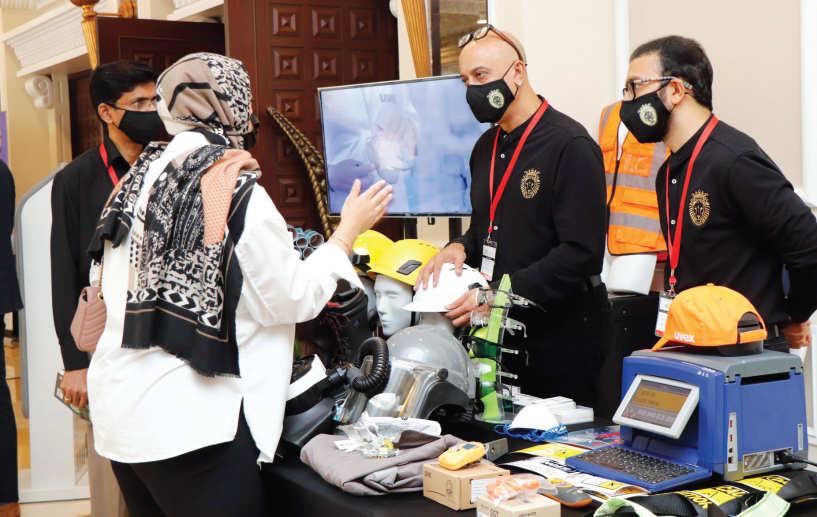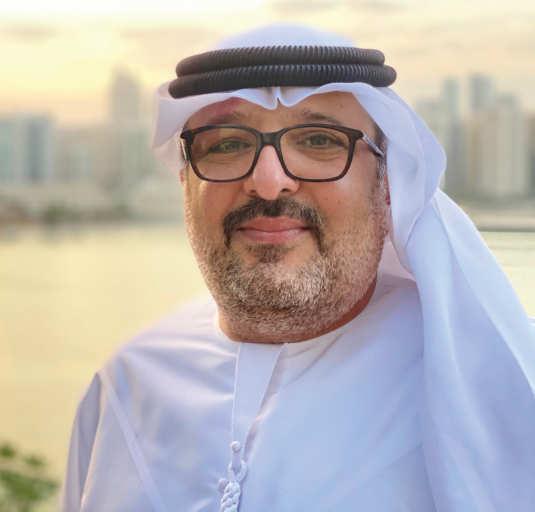
7 minute read
MENA HSE Forum
Sharing best practice in HSE and ESG
The renowned MENA HSE Forum returns to Dubai in September, featuring the leading lights of health and safety from the region's foremost companies and organisations.
ABOVE: The event returned to a live format in 2021. Industry leaders from key sectors including oil and gas, construction and tourism will convene along with regulatory authorities for the seventh edition of the MENA Health, Safety & Environment Forum, taking place in Dubai from 6-7 September 2022.
ADNOC, Petrofac, Aramco, KOC, AMAALA, Dubai Municipality, EGA, Abu Dhabi Waste Management Center (Tadweer) and Dubai Holding among others, will deliver keynote presentations to more than 200 stakeholders from the HSE community in UAE, Saudi Arabia, Kuwait, Qatar, Oman and Bahrain.
The MENA HSE Forum is the annual meeting point for MENA regulators, HSE practitioners and solution providers to come together to discuss current HSE developments and define their health, safety and environment strategy for a sustainable future. Attendees will receive insights on all the latest HSE trends and critical new technology, network with peers and industry partners, meet expert suppliers and industry bodies and lay the groundwork to achieve the fundamental HSE targets that matter most to the region.
Khushboo Narang, the conference producer, said, “This industry-leading conference will give unique access to expert analysis coupled with unrivalled business development opportunities in a brand new format, specifically designed to help the GCC’s most important organisations embrace and achieve a safe and sustainable future.”
The conference agenda, under the strapline 'Optimise your HSE and ESG strategy by utilising innovative digital solutions and best-in-class frameworks to exceed new regulatory expectations', will comprise five sessions: ■ The role of HSE leadership in crisis and business continuity management ■ The future of digitalisation in the HSE sector ■ Process safety and its framework
■ Learning from the pandemic and other global transformations about occupational health and behavioural safety ■ Sustainable value creation: how
ESG moved from a cost centre to a value driver. Two exclusive breakout workshops will cover the formulation of resilient safety cultures, and digital transformation – from strategy to execution.
Speakers set to present at the MENA HSE Forum 2022 include Tahir Azhibek, corporate HSE manager, ADNOC; Lynn Hobballah, head of health and safety, Petrofac; Dr Naseem Mohammed Rafee, director of health and safety department, Dubai Municipality; Eng Raed Mohammed Al-Marzooqi, manager of studies and system section, health and safety department, Dubai Municipality; Dr Eng Hani Hossni, EHS director, Tadweer; Brian Maynard, HSE director for AMAALA; Saleh Ali Albalushi, HSE director, Dubai Holding Asset Management; Salman Abdulla, executive vice president, EHSQ & Sustainability, Emirates Global Aluminium; and Dr Essam Hassan, senior environmental consultant, Egyptian Environmental Affairs Agency and KGESS.
Effective process safety management
In advance of the Forum, Dr Eng Hani Hossni, EHS director, Abu Dhabi Waste Management Center (Tadweer), spoke to Health, Safety & Security Review Middle East on Tadweer’s approach to safety management.
What are the main process safety hazards you face at Tadweer?
The main safety hazards in waste management result from the improper handling of hazardous waste, which might cause harm to human health. To minimise such risks, the UAE government has launched major initiatives to handle waste management, which include recycling, converting waste to energy and resources, utilising new technologies, and improving waste separation and collection systems. This limits the risks that might result from improper waste disposal.

The latest health and safety technologies will be showcased at the event.
What do you think are the most important factors for delivering a successful and effective process safety management programme, and how have you approached this at Tadweer?
Complying with regulatory requirements is key for delivering a successful and effective process safety management programme. At Tadweer, we ensure we adhere to the highest local and international standards in health, safety, and environment management. During our operations, we ensure we are safeguarding the health, safety and welfare of our employees and the public, and ensure that our operational activities are effectively controlled with regard to the protection of the environment.
Tadweer’s Occupational Safety and Health (OSH) policy highlights the importance of putting preventive measures in place to avoid and mitigate occupational health and safety risks. It also outlines the company’s commitment to reviewing, monitoring, evaluating and improving our OSH performance.
What are the main challenges you face in EHS management, and how have you overcome them?
Some challenges in EHS management include pollution and excessive noise, improper handling of material, health issues, and more. At Tadweer, we develop the required systems for managing waste including collection, transport, treatment, safe disposal and pest control services through the use of environmental service providers and technology, to preserve the environment.
We have also set a list of health and safety requirements for our contracts, to limit any potential risks caused by waste management. For example, the contractor and subcontractors are required to supply all workers with the personal protective equipment (PPE) needed to protect them from any potential risks. These include a safety hat, safety footwear, coloured overall indicating the company’s name, high visibility vest, eye protection, and gloves. In addition, all workers on site must attend an EHS induction by the contractor. We make sure that all our contractors comply with our EHS requirements, through controlling noise, displaying safety signage, having storage for hazardous material, and preventing pollution.
How do you ensure continuous improvement and adherence to global standards?
The Abu Dhabi Waste Management Center (Tadweer) is committed to providing the highest quality waste management services in the Emirate of Abu Dhabi, in line with the best international standards and global practices to achieve sustainability and integrated waste management. We also adopt the most effective methods of public health pest control that align with the directives and vision of Abu Dhabi 2030 to improve eservices in various fields and promote the digital transformation of government agencies in the UAE.
To achieve this mandate, the Center continues to promote cooperation with various entities and launch initiatives and projects that invest in financial, human, and technical resources.

What do you think is the role of technology in promoting safe and efficient operations?
Tadweer is keen to invest in the latest technological advancements that maximise efficiency and promote safety. The Center has provided a wide range of electronic services. These services include providing all recycling services on the Unified Digital Platform (TAMM), providing an access feature using digital IDs, linking with the SADAD Payment System, linking with the Abu Dhabi Department of Health through digital documentation services, as well as providing a dashboard to reduce waste production, and a new version of the licensing and tariff system.
Last year, we introduced Internet of Things (IoT) technology at the construction and demolition waste recycling station in the Al Dhafra region of Abu Dhabi, a first-of-its-kind step in the Middle East. The implementation of this technology increases operating time to the maximum limit, while also improving energy efficiency by smart remote movement sensors, which will monitor the station’s assets and machinery. The Internet has also allowed the incorporation and use of iAuditor application, which is a comprehensive solution for carrying out inspection, monitoring the findings, assigning actions, and is interlinked to the department members’ email identification for the ease of analysing and tracing.
How important is it to instil a good safety culture and ensure employee engagement for a successful safety management programme?
As part of our strategic plan, Tadweer is promoting a sound health and safety culture among its various stakeholders. We identify, study and evaluate the applicable industry best practices and are continuing to identify challenges develop roadmaps and review both improvement and development strategies and best practices in the field of occupational safety and health.
Last year, the Center achieved a compliance rate of 95% of its occupational safety and health management system in line with the requirements of the Abu Dhabi Occupational Safety and Health System in 2021. This achievement came after the completion of the project for the development of Tadweer’s occupational safety and health management system, as well as playing the role of regulator for the waste sector in the Emirate of Abu Dhabi; this covers 146 entities comprising 100 low and medium-risk entities, and 46 high-risk entities, with a total of approximately 23,000 employees. The Center also completed an employee training plan for environment, health, safety, and business continuity, recording a total of 3,300 training hours in the waste sector during 2021. ❖
Image Credit: Tadweer
Dr Eng Hani Hossni, EHS director, Abu Dhabi Waste Management Center (Tadweer).
You can find out more about the MENA HSE Forum and register at www.hseforum.com/mena/conferencebrochure








